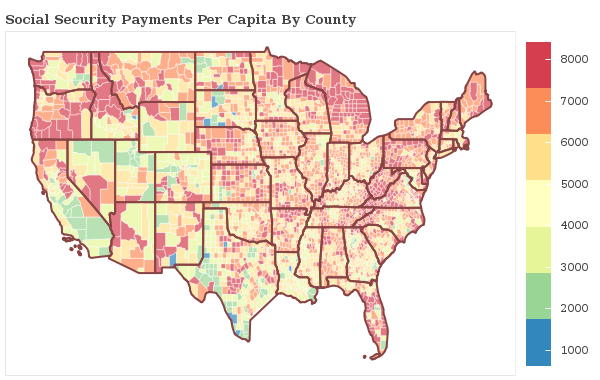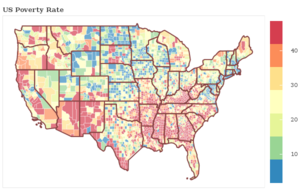North Carolina Social Security
How does North Carolina rank for social security payments?
North Carolina ranks 29th out of 50 states for lowest Social Security dollars per capita at $2,288.39. The study is based on a total of 10,052,564 North Carolinians who received a reported $23,004,142,300 in Social Security Payments in the past year.
North Carolina Social Security Payments By County

North Carolina Social Security Received Map
Social Security Received By County
The percentage of households receiving social security in North Carolina varies by county.
Applying For Social Security in North Carolina
How do I apply for Social Security Benefits in North Carolina?
Social Security Benefits are administered by the Federal government, and are available to citizens of all states including North Carolina. There are 17 government social security benefits that you may apply for as a resident of North Carolina.
Want to explore more government assistance programs? Browse all government benefits available to North Carolina residents or all Social Security Benefits
North Carolina Social Security Payments by City Statistics
How do the per capita social security payments compare across the largest cities in North Carolina?
| City | Payments | Details |
|---|---|---|
Cary |
$1,706.92 |
Cary ranks 63rd of 442 among cities in North Carolina with the lowest social security payments. Cary residents received $272,620,000 in social security payments in the past year. |
Charlotte |
$1,447.21 |
Charlotte ranks 32nd of 442 among cities in North Carolina with the lowest social security payments. Charlotte residents received $1,195,482,700 in social security payments in the past year. |
Durham |
$1,561.29 |
Durham ranks 43rd of 442 among cities in North Carolina with the lowest social security payments. Durham residents received $401,614,200 in social security payments in the past year. |
Fayetteville |
$1,571.65 |
Fayetteville ranks 44th of 442 among cities in North Carolina with the lowest social security payments. Fayetteville residents received $330,556,400 in social security payments in the past year. |
Greensboro |
$1,965.78 |
Greensboro ranks 104th of 442 among cities in North Carolina with the lowest social security payments. Greensboro residents received $559,886,400 in social security payments in the past year. |
Greenville |
$1,409.32 |
Greenville ranks 28th of 442 among cities in North Carolina with the lowest social security payments. Greenville residents received $127,328,200 in social security payments in the past year. |
High Point |
$2,092.67 |
High Point ranks 126th of 442 among cities in North Carolina with the lowest social security payments. High Point residents received $229,877,300 in social security payments in the past year. |
Raleigh |
$1,492.55 |
Raleigh ranks 37th of 442 among cities in North Carolina with the lowest social security payments. Raleigh residents received $670,867,400 in social security payments in the past year. |
Wilmington |
$2,325.20 |
Wilmington ranks 176th of 442 among cities in North Carolina with the lowest social security payments. Wilmington residents received $268,005,000 in social security payments in the past year. |
Winston-Salem |
$2,118.81 |
Winston-Salem ranks 131st of 442 among cities in North Carolina with the lowest social security payments. Winston-Salem residents received $508,923,300 in social security payments in the past year. |
Research & Reports
Social Security Statistics
How does North Carolina compare nationally? See which states receive the most social security payments.
We breakdown over 3,000 counties nationwide and rank states with the most and least social security payments given to residents.
Social Security StatisticsFood Stamp Recipients in North Carolina
Which areas receive the most food stamp public assistance in North Carolina? We breakdown food stamps by city and county statewide and rank communities with the most and least food and nutrional supplements given to residents.
North Carolina Food Stamp StatisticsNorth Carolina Poverty Statistics
Which areas have the highest rate of poverty in North Carolina? We breakdown the poverty rate by city and county across North Carolina and rank communities with the highest and lowest concentrations of residents living below the poverty line.
North Carolina Poverty Statistics2018 North Carolina Poverty Line
| Household Size | Poverty Level |
|---|---|
| 1 | $12,140 |
| 2 | $16,460 |
| 3 | $20,780 |
| 4 | $25,100 |
| 5 | $29,420 |
| 6 | $33,740 |
| Per Additional | +$4,320 |
The poverty line for North Carolina in 2018 is based on the federal guidelines, which begins at $12,140 for a single person, adding $4,320 for each additional person.



